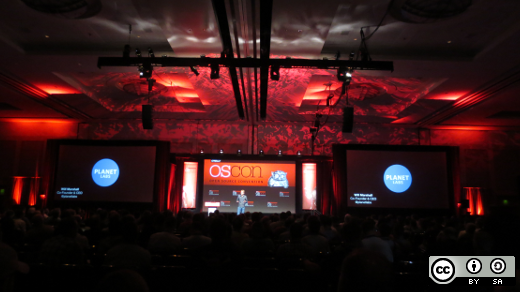We're back with keynote coverage on Day 2 of OSCON 2014! This comes to you (live stream) from Portland at the Oregon Convention Center.
See our Day 1 keynote coverage.
Tim Bray: Threats
There are many threats to our civil liberties and freedom of speech that we can strive to change through politics and policy as well as through our work as engineers. Some of those issues can be seen in the media, like on Model View Culture who recently published an issue on open source covering open companies, open source communities, and the technical "talent shortage."
Let's get our engineers talking to legal in their companies and pushing for the use of Https, OpenPGP, and more.
Racing Change: Accelerating Innovation Through Radical Transparency
Sarah Novotny (NGINX) moderated a panel with Edwin Aoki, Danese Cooper, and Josh Bleecher Snyder from PayPal.
PayPal is going through an internal transformation. They are taking the open source model and bringing it in-house, commonly referred to as innersourcing. The panel talked about how the company is committed to getting it right and they believe the open source model will help them break down the silo's that exist. They also believe it will make their developers better open source citizens.
"The keys around open source and innersource are trust and transparency," said Edwin Aoki. So far, PayPal has paid down a lot of technical debt and they are well on their way, but not there yet.
Simon Wardly: Anticipating the future—an introduction to value chain mapping
Simon first mentions this great news: UK government makes "big step forward" on open document standards!
Businesses don't have great situational awareness and instead tend to copy others. How can businesses have better situational awareness? They can create value chains by mapping out user needs. Businesses' products and services change and evolve over time, and this process is driven by competition, by demand and supply. To see well and take control over the direction of our businesses overtime, we need to be able to manipulate various aspects of our business. Simon adds, manipulation using open techniques. He did a study and found that companies using open techniques on purpose did much better over time than companies either using closed strategies or open by default (versus of open on purpose).
Recommended reading: The Challenge of the Computer Utility by Douglas Parkhill
Checking Your Privilege: A How-To for Hard Things Leslie Hawthorn (Elasticsearch)
"Hello, humans," was Hawthorn’s onstage greeting. Then, she shared the story of how she learned about racism. Hawthorn thinks we are afraid and that if we begin to learn about how others not like us, then there will be things that we see that we can not unsee. We will discover and be ashamed of our past behaviors.
"When you are a participant and all of the defaults are configured to work for you out of the box, you never think about adjusting them,” said Hawthorn. She showed a slide referencing Google’s employment demographic statistics—without transparency, we can not solve this problem.
"When we are participants in a system that causes damage to some, the only component we can change is to change ourselves," said Hawthorn. She outlined three things we can do.
- Experiment #1 - Practice active listening. Hawthorn uses Twitter to follow people not like her, but have the same passions. Your soul job for this experiment is to listen. Don’t retweet, just listen.
- Experiment #2 - Change your speech. Remember her opening, “greeting humans?” That was intentional.
- Experiment #3 - Speak up for others. Do this tactfully, with mutual respect, and love. At the very least, say something in private. If you see something, say something. Correct gently.
Take the conversation online and since HowToForHardThings was too long, use the hashtag #HTHT.
Tim O'Reilly: What kind of world do we want to build?
We've been exploring the ideas of open source that were presented over 20 years ago in books like The Cathedral & The Bazaar by Eric Raymond. The notion of taking for free and then giving back is central to open source—and it's something we can't forget during the era we live in of politics and Silicon Valley companies who ask: "How well can I do for myself?”
People like Steve Yegge and Mark Burgess, and companies like Amazon, talk about their transformation through empathy for people, not data or financial success. This is also the story behind DevOps, and the true essence of DevOps is empathy.
The Healthcare.gov rescue was about debugging the human failures, the failed communications—it was a cultural failure that lead to breakdown of healtchare.gov. Healthcare.gov was designed and delivered by a system that doesn't allow developers to make promises to each other.
The questions we should be asking ourselves is: How do we make things work for users? What kind of world do we want to build?
Recommended reading: The Phoenix Project (check it out on our annual reading list)






Comments are closed.